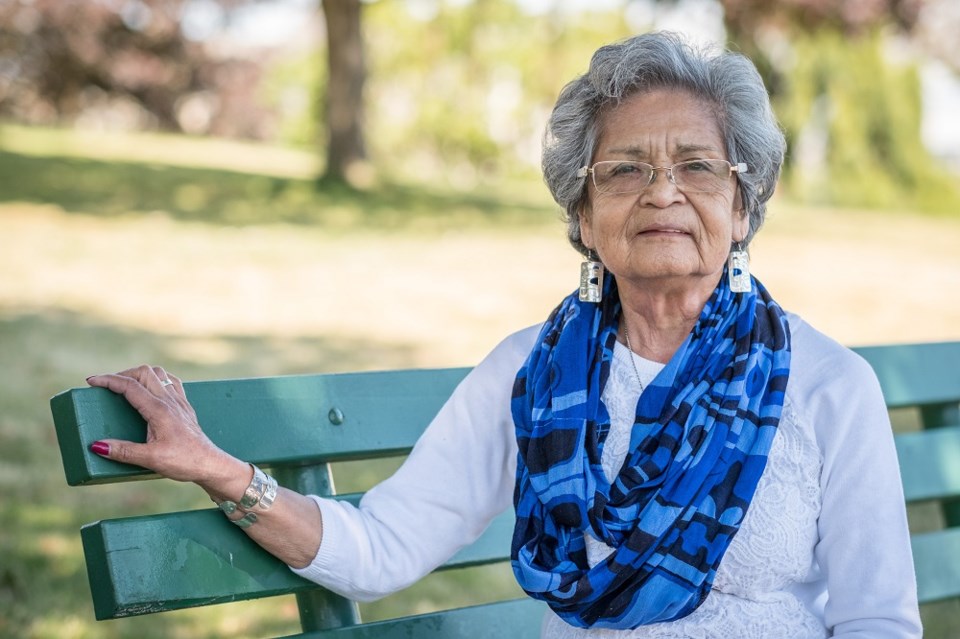When Marjorie White left her reserve on Vancouver Island in the mid-50s to pursue a nursing career in Vancouver, she never imagined what kind of footprint she’d make in the years that followed.
Shortly after arriving to the Lower Mainland and realizing there was no support for First Nations people migrating to urban centres, the New West resident helped establish the first aboriginal service agency in Canada. From one friendship centre grew 24 more, making it the largest network of service-providing agencies in the province. White also helped create the National Association of Friendship Centres, which currently represents 118 groups and seven provincial and territorial associations.
She was the first aboriginal person appointed as a citizenship court judge in Canada, as well as the first woman and first aboriginal person appointed to the Vancouver police commission.
On June 14, White received British Columbia’s highest honour and was appointed to the Order of B.C. The Record recently caught up with her to chat about her career and why she has no plans on slowing down.
Take us back to 1963 when the committee was struck to set up a friendship centre for aboriginals moving from reserves and into Vancouver. What were migrants going through at the time?
I was one of those (migrants), and that’s why I was so interested in getting something started. I migrated to Vancouver to take a course. So when I got here, there were absolutely no services available for migrating aboriginal people into the urban area. … (Like) a meeting place where you could associate with your own people. There was no affordable housing and just no information centres to guide you. It was very challenging because you come from a very small, remote area and all of a sudden, there’s this huge city that you don’t know and never visited before.
There are now 25 centres in B.C and more than 100 nationwide. Did you ever think you’d make this kind of impact?
No, I never thought that would happen, you know, because it was just me focusing on how I see what the gap was in urban cities like Vancouver. I really didn’t know it would expand to what it is today and across Canada as well. When I started the National Association of Friendship Centres, there were just a few people who had incorporated as a service agency or they were already providing some services, maybe out of a church basement or garage. I don’t think any of us really thought that we would survive till today because we struggled so much to get funding. We’re still struggling to get funding.
You also founded the Circle of Eagles Society, a halfway home for those leaving incarceration, and served as its executive director for 15 years. What led you to establish that organization?
When I became the executive director of the Vancouver aboriginal friendship centre, I had calls from the institutions to come out to visit them and to listen to some of their needs. So I started what was called the Indian Education Club in those days. I started visiting them and just listening to what their needs were, and they themselves identified they needed a safe place to live when you’re released back into the community. In 1970, we opened a house from funding from the provincial government, so we were able to get that organization started. Like everything else, it’s a big challenge, but fortunately in those days, the needs for zoning and (the) bylaws weren’t as strict as they are today, so we opened the halfway house without too much of a challenge.
Of the many accolades you’ve received, there’s the Queen’s Golden Jubilee Medal, the YWCA’s Women of Distinction Award, the Courage Award from the Vancouver aboriginal community policing and many more. Now, the Order of B.C. How does it make you feel?
Getting this particular award makes me feel like I have accomplished something in my efforts to provide a better quality of life for the aboriginal people migrating into urban cities. As I’ve worked in the communities, it’s never been about recognition for myself, or feeling like I deserve that, just really focusing on what the needs are of the people. For me, it was just identifying what are the gaps in services for our people because one organization could not do everything for everybody.
You sit as the Elder Advisor to the B.C. Association of Aboriginal Friendship Centres’ (BCAAFC) executive committee and are a senator for the National Association of Friendship Centres. Most recently, you co-founded the BCAAFC Elders Council, which acts as an advisory body to the provincial board of directors. At 80 years old, people usually take a step back, but you’re still actively engaged. Why is that?
I think that my continuing interest in what I’ve been doing all of my life is keeping me young and keeping me active and keeping me aware of what is going on in our community. For myself, I have developed such an interest in helping people over the years that it’s very difficult to just say I’m retired now. It’s in my blood to be available, to assist wherever I can.



